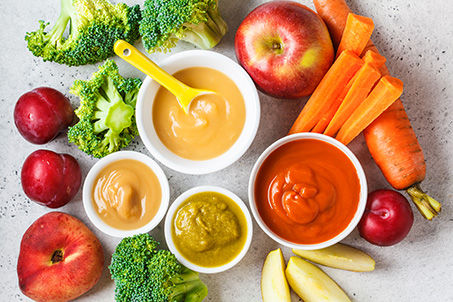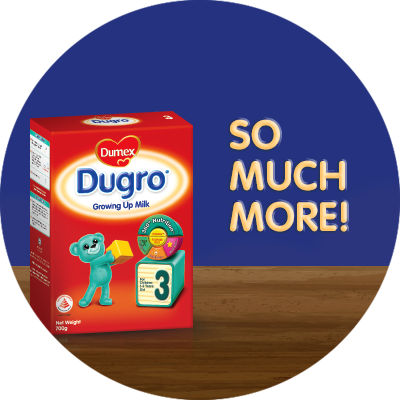Breastfeeding is the best for babies and a healthy diet / maternal nutrition is important when breastfeeding. A decision not to breastfeed can be difficult to reverse. Infant formula is suitable from birth when babies are not breastfed. It is recommended that all formula milks be used on the advice of a doctor, midwife, health visitor, public health nurse, dietitian, pharmacist, or other professional responsible for maternal and child care and the financial implications should be considered. All preparation and feeding instructions should be followed carefully as inappropriate preparation could lead to health hazards.
Supplements and Vitamins for your Toddler

What to Know
The medical community is itself torn over whether healthy toddlers need extra vitamins, or whether "all natural" is the way to go. The Ministry of Health recommends that the rule of thumb is to always ensure that your child gets his nutrients through natural food sources. Where certain vitamins are still lacking from the diet, parents may then look to supplements that provide an adequate supply of vitamins.1
To find out what is best for your child, we recommend that you speak with your doctor and refer to the Health Promotion Board's
Recommended Daily Allowances to ensure that your child is getting the optimal amount of nutrients for his age.2 It is crucial to keep in mind that supplements cannot substitute natural and nutritious whole foods, and any supplement should be taken in conjunction with a healthy diet. This is because the body absorbs nutrients from natural foods much more effectively than from supplements. However, if your child is not eating well, giving him a multivitamin in addition to gradually improving his eating habits is a good start.
If you’re thinking of giving your toddler certain nutrient supplements, here are some things to note:
Vitamin D
Vitamin D increases the body's ability to absorb and retain calcium and phosphorus – both of which are crucial for building strong bones. Deficiencies in Vitamin D can lead to rickets, a bone-softening disease that usually impacts children in the first two years of life. Natural-occuring Vitamin D is obtainable from foods like oily fish (trout, salmon and sardines), eggs and fortified foods like dairy, yogurts and freshly-squeezed orange juice. Exposure to sunlight (without sunscreen for a few minutes daily or most days) can also be important, since Vitamin D is naturally present in relatively few foods!
Vitamin B12
Next up, we have Vitamin B12! This keeps the body's nerve and blood cells healthy, and helps make DNA – the genetic material in all cells. Vitamin B12 deficiency is dangerous as it causes a particular type of anemia called megaloblastic anemia that makes people tired and weak. If your toddler eats little or no animal products, it might be important to supplement his diet with a B12 Vitamin. Just make sure to check with your child’s doctor about the correct dosage beforehand!
Iron
Another important mineral is Iron, a key component of red blood cells which carry oxygen to all parts of the body to help the body's production of energy. This is essential for growth and development, metabolic and cellular function and synthesis of hormones and connective tissues. There are two types of iron, heme and non-heme. Meat, seafood and poultry contain both types while plant and fortified foods contain only non-heme iron. It is crucial to note that we absorb more iron from heme than non-heme sources!
Toddlers of 12-36 months need 7 milligrams of iron per day so their diets should be rich in lean meats, seafood, nuts, beans, vegetables, whole grains and fortified cereals.3 You should also try to incorporate foods that are naturally high in vitamin C (for example, papaya, peppers, broccoli, strawberries and pineapple) because vitamin C helps to enhance iron absorption!
For toddlers who do not meet the suggested intake, liquid iron supplements are recommended, but children 3 years and up may take a chewable multivitamin.
What can you do?
Here are seven tips on how you can incorporate these Vitamins into your child’s diet!
1. Include a variety of fruits, vegetables, whole grains and protein-rich animal and plant foods in your child's weekly diet
Focus on creating a balanced week of meals choices rather than trying to incorporate every single nutrient into a single day. Changing up the foods you offer your toddler for meals and snacks will allow him to experiment with different textures, tastes and colors of food. This will make him much more likely to enjoy eating a balanced diet!2.
2. For children on a plant-based diet: talk to your physician about supplements of vitamins B12 and D.
If your child is not eating dairy or eggs, he may be missing out on certain nutrients and require additional supplements. It is advisable to speak to your child’s pediatrician on whether your child needs supplements.
3. Avoid 'gummy' vitamins for your toddler
Gummy vitamins are not only choking hazards for young toddlers, but some pediatric dentists think they may be causing childhood dental cavities. Gummy vitamins also confuse supplements with sweets. Liquid vitamins may be a much better alternative.
4. Never refer to vitamins as 'candy'
Treat vitamin supplements like medicine — keep them in a locked place or on a high shelf, follow all directions on the bottle for proper dosage based on your child's age and weight and never let your child serve himself.
5. Unless specifically advised by your physician, do not supplement your toddler's diet with liquid meal supplements or shake
Drinks such as nutritional shakes, meal replacement shakes, nutritional drinks, and protein shakes may be used when a toddler is either underweight or failing to gain weight (or both).
6. Brush with fluoride toothpaste and talk to your pediatric dentist or physician about fluoride supplements
Using a small rice-sized knob of fluoride toothpaste, brush your child’s teeth twice per day. Once your toddler reaches the age of three, you can increase the amount of toothpaste to the size of a pea.
1 https://www.healthhub.sg/a-z/diseases-and-conditions/740/Vitamin-Supplements-for-Children
2 https://www.healthhub.sg/a-z/diseases-and-conditions/740/Vitamin-Supplements-for-Children
3 https://www.healthhub.sg/live-healthy/192/recommended_dietary_allowances
Read More

Ask Our Careline
Whatever’s on your mind, we’re here to help




